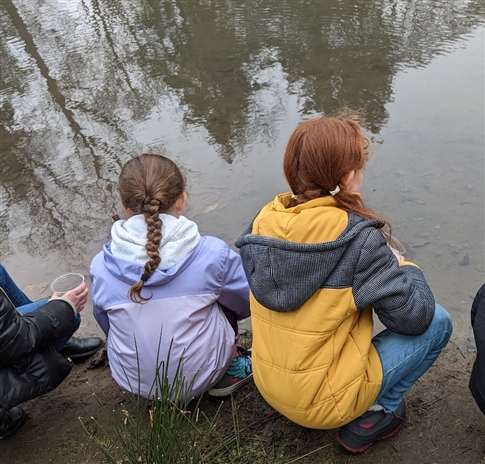Related News
Related News
-
EWEB Board of Commissioners selects BPA administrator for general manager role
In a unanimous vote, EWEB’s Board voted to move forward with negotiating an employment offer to BPA’s John Hairston.
Find Out More -
EWEB Board adopts 2026 organizational goals to guide utility priorities
At the January public meeting, EWEB adopted a new set of organizational goals for 2026, providing direction for our work priorities in the year ahead.
Find Out More -
Our Favorite Photos of 2025
For a final look-back at 2025, we’d like to share some of our favorite photos that illustrate our work day-in and day-out. We celebrate amazing teamwork, vital partnerships, and sing the praises of our individual champions and their quiet dedication to serving our community!
Find Out More -
EWEB and the UO launch energy generation pilot project
Pilot project gives EWEB the option to run UO’s on-site natural gas generator this winter, gathering valuable insight into the generator’s efficiency and reliability.
Find Out More -
Sustainability Snapshot - Celebrating Energy Efficiency Projects in the Community
Sustainability Snapshops highlight impactful projects completed by EWEB's Customer Solutions department, as a way to celebrate the meaningful work happening behind the scenes.
Find Out More -
EWEB Sets 2026 Budget and Rates, Advances Evaluation of McKenzie Valley Service Territory Realignment
Taken together, the 2026 budget and rate adjustments and the territory-realignment evaluation reflect EWEB’s dedication to responsible financial stewardship, modern, resilient utility infrastructure, and thoughtful planning for the future.
Find Out More -
EWEB secures $2.5 billion of reliable, affordable, carbon-free energy for customers
The new contract with EWEB’s largest energy supplier, the Bonneville Power Administration, forms the foundation of a diverse energy portfolio.
Find Out More -
EWEB Hometown Heroes compete internationally
Out of 290 teams from 14 different countries, EWEB's Lineman Rodeo team places in the top third of competitors.
Find Out More -
EWEB Hosts Annual Spill Drill to Protect McKenzie River
EWEB led emergency responders in its annual “spill drill” on the McKenzie River on Wednesday, Oct. 15, at the Trail Bridge Campground.
Find Out More -
A day in the life: Monitoring water quality throughout the McKenzie Watershed
Follow Senior Environmental Specialist David Donahue as he collects water quality samples from throughout the watershed as part of EWEB's early warning system for threats to Eugene's drinking water.
Find Out More -
EWEB Partners with Eugene School District 4J to Celebrate New Kennedy Middle School Emergency Water Station Site
Hundreds of attendees practiced filling up water containers at Saturday's demonstration event.
Find Out More -
Quartz Creek: Setting the Stage for Floodplain Restoration
The project resets the floodplain along 1.8 miles of a formerly channelized creek to improve water quality, fish habitat and natural disaster resiliency.
Find Out More -
Pure Water Partners: 5 Years of Regeneration
As EWEB and the Pure Water Partners observe the fifth anniversary of the Holiday Farm Fire, we celebrate major milestones in the watershed's recovery and check back in with PWP landowners who still have a lot of work ahead as they continue to rebuild their lives.
Find Out More -
You can’t predict the next disaster, but you can prepare
The earthquake lasted less than a minute. But now the power’s out. The tap runs dry. Cell service is spotty. Would you be ready?
Find Out More -
EWEB completes helicopter installation of salmon habitat features
EWEB adds downed trees and 2,000 tons of gravel to the Uupper McKenzie River below Tamolitch Falls to improve spawning habitat.
Find Out More - Show More
Eugene elementary students release salmon back to the wild
December 15, 2022

At Alton Baker Park this week, Eugene 4J elementary students bid farewell to baby salmon they’d raised from eggs in their classrooms this fall. The activity was part of the Salmon Education Program funded by EWEB grants.
Tana Shepard is the coordinator of the EWEB/4J Education Partnership.
“Students from across the district have raised salmon since October. And this is our release moment. And so, kids come to the park here at Alton Baker,” Shepard explained. “This is a connector to the home stream of the salmon, which would be the Willamette River. And they give their fish wishes and release their salmon.”
Each student takes a plastic cup holding river water and a tiny salmon which they carefully let go in the canal near the Cuthbert Amphitheater. This year, more than 60 4J classrooms participated in raising salmon from eggs in aquariums. Shepard said it’s a way to help kids understand the importance of this keystone species. 
“It's a part of the ecosystem that if that part of the ecosystem fails, the entire ecosystem fails,” Shepard said. She says salmon are among many keystone species that are endangered.
“So that's kind of it's just a great way for the kids to understand a little bit how ecosystems work, what is needed for a healthy habitat, what a riparian zone is, and why that's important and why there's laws around it, that sort of thing,” Shepard said. “And just the impacts that we as humans have on the planet and this particular species.”
During the release party, students also participated in a game called “Close Encounters of the Salmon Kind”, which takes them through all the obstacles salmon face as they journey out to sea and back to their home spawning grounds in rivers and creeks.
EWEB’s education grants are supported by ratepayers. The 4J/ EWEB Education Partnership is an environmental science program that supports learning opportunities around climate change and its effects in the Pacific Northwest.

